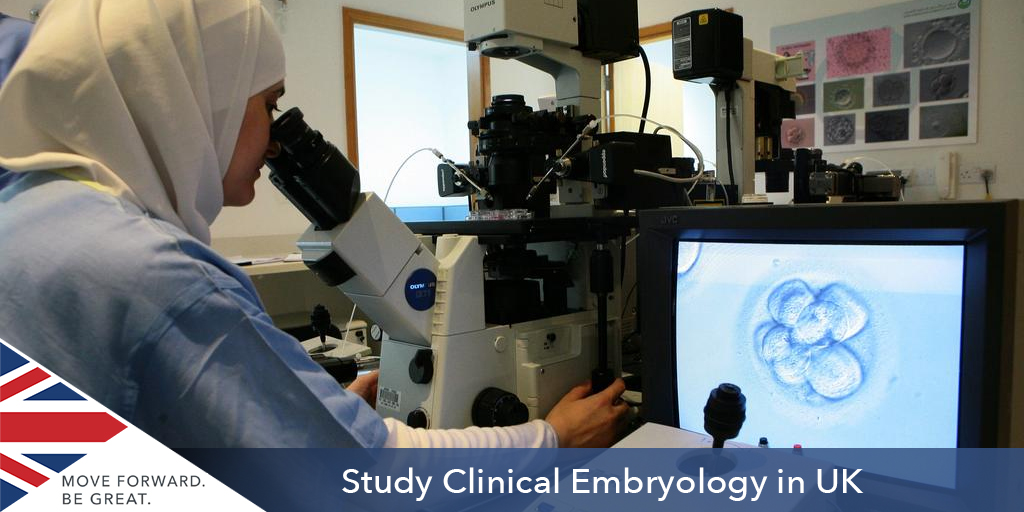Embryologists study the beginning of life and the science of reproduction. An embryologist is a scientist working with sperm, eggs, and embryos. A Master's in Clinical Embryology is pursued by clinical scientists and clinicians for academic and professional development in reproductive science, infertility and in vitro fertilisation (IVF).
Embryologists most commonly work with physicians to assist patients who have reproductive health issues. They usually work in hospitals and fertility clinics and may also perform laboratory work, research work, or seek posts in academic institutions.
As embryologists, students perform diagnostic services and embryological procedures, such as IVF, at clinics and hospitals. Students will also be occupied with collecting, storing, recording, testing and fertilising eggs from patients. An embryologist’s work is generally carried out as part of a multidisciplinary team, including obstetricians and gynaecologists, doctors, specialist nurses and counsellors.

Five Great Embryology Courses at UK Universities
Below is the list of five UK universities offering world-class embryology courses.
1. Liverpool John Moores University
The Clinical Embryology MSc programme, a collaboration between LJMU and CARE Fertility, offers a unique opportunity to specialise in fertility treatment and reproductive research. Taught by academic and industry experts, it emphasises practical experience and current advancements in assisted reproduction. The course grants access to cutting-edge facilities at both institutions, including CARE Fertility's specialised training laboratory.
With a research-led curriculum and focus on emerging technologies, graduates are well-prepared for careers in the fertility treatment sector. This programme equips students with the skills and knowledge needed to excel in the rapidly evolving field of assisted reproductive technologies.
- Suggested course: MSc Clinical Embryology
- Entry requirements: A minimum 2.1 honours degree in Biological Science or another related biological sciences degree
- International fee: £30,000
2. University of Aberdeen
The BSc in Human Embryology and Developmental Biology at the University of Aberdeen offers a comprehensive education in modern biology, covering morphology, experimental embryology, molecular genetics, stem cell biology, and biotechnology. This program focuses on research in developmental biology, which is pivotal in addressing human genetic diseases and advancing modern medicine, including stem cell therapy and tissue regeneration.
Through a combination of compulsory and optional courses, students gain a strong foundation in medical sciences and research skills. Yearly progression allows for deeper exploration, culminating in an honours year with specialised coursework and a research project in developmental biology.
- Suggested course: BSc Human Embryology and Developmental Biology
- Entry requirements: International Baccalaureate - 32 points, including 5, 5, 5 at HL, with two Mathematics/ Science subjects at HL.
- International fee: £24,800
3. University of Dundee
The University of Dundee’s master’s degree in human clinical embryology addresses the global challenge of infertility by offering a detailed education in human clinical embryology, andrology, and assisted reproductive technology (ART). With a focus on practical skills development, students gain hands-on experience in sperm handling and laboratory techniques related to ART procedures. Taught within Ninewells Hospital in Dundee, students observe patient journeys in NHS clinics, gaining insight into clinical procedures and patient care. Led by experienced professionals, the programme combines theoretical knowledge with practical application and research opportunities, preparing graduates for careers in clinical or research settings within the ART field.
- Suggested course: MSc Human Clinical Embryology & Assisted Conception
- Entry requirements: A UK Upper Second-Class Honours (2:1) degree OR a UK Medical degree (or an international equivalent).
- International fee: £35,685
4. University of Leeds
The University of Leeds offers the MSc in Clinical Embryology and Assisted Reproduction Technology (CEART), a specialised vocational course for recent graduates in various disciplines. With a focus on human reproduction, infertility, and laboratory techniques, students receive comprehensive training in clinical embryology, andrology, and ART.
The programme emphasises the development of practical skills and includes modules on laboratory management, ethics, and law. Students benefit from small class sizes and a research project portfolio. Furthermore, the course promotes international networking opportunities, enabling collaboration with practitioners worldwide and broadening understanding of global practices in reproductive sciences.
- Suggested course: MSc Clinical Embryology and Assisted Reproduction Technology
- Entry requirements: A bachelor's degree with a 2:1 (Hons) in an appropriate biological, biomedical or veterinary science subject, medicine or healthcare sciences, or equivalent qualification.
- International fee: £38,500
5. University of Oxford
The MSc in Human Reproductive Biology, Embryology, Infertility, and Assisted Reproductive Technology (ART) offered by Oxford University provides detailed theoretical and practical training in reproductive sciences. Based at the Institute of Reproductive Sciences alongside Oxford Fertility, students receive hands-on laboratory training in gamete micromanipulation techniques and essential skills.
The course spans three terms, covering fundamental science, clinical applications, and a research project. Students benefit from individual training on equipment and extensive exposure to clinical settings, fostering career development. Emphasis is placed on ART's legal, ethical, and quality management aspects. Professional development seminars enhance communication, presentation, and experimental design skills, preparing students to become future leaders in clinical embryology globally.
- Suggested course: MSc in Clinical Embryology
- Entry requirements: A first-class or strong upper second-class undergraduate degree with honours in a subject related to biology, biomedical science or a medical degree.
- International fee: £48,140
Studying Clinical Embyology
Entry requirements
To become a clinical scientist working in embryology, students need a degree in a relevant subject such as biology, biomedical sciences, microbiology, genetics or biochemistry. Embryologists start their careers with an undergraduate degree in a biological science field before moving into a master's degree. A master's degree can be pursued in reproductive science or clinical science.
Skill requirements
Embryologists need a practical and theoretical understanding of human reproductive biology, embryology and infertility. Desired skills include communication and interpersonal skills, teamwork skills to work as a multidisciplinary unit, the ability to make sound judgements, an analytical mind, an adaptive approach and the ability to work under pressure.
Careers in embryology
Embryologists can work with doctors to aid patients needing reproductive help, or they can work in research. An embryologist's work may include fertility medical procedures, research, writing, or patient consultations. Individuals trained in embryology can pursue a career as a fertility researcher, embryologist and professor.
In the UK, the NHS employs many clinical scientists working in embryology in assisted conception units. Independent clinics also employ them for fertility treatment.
Study Embryology in the UK
If you want to pursue a degree in embryology at a UK university, visit your nearest SI-UK India office or book a free consultation to learn about the best UK embryology courses suited for you today.












 I sincerely thank SI-UK for getting me accepted to UCL. The MSc in Urban Development and Planning is extremely competitive, but the right guidance provided by SI-UK made my dream of studying at University College London a reality. The services were exceptional from beginning to end.
I sincerely thank SI-UK for getting me accepted to UCL. The MSc in Urban Development and Planning is extremely competitive, but the right guidance provided by SI-UK made my dream of studying at University College London a reality. The services were exceptional from beginning to end. 

